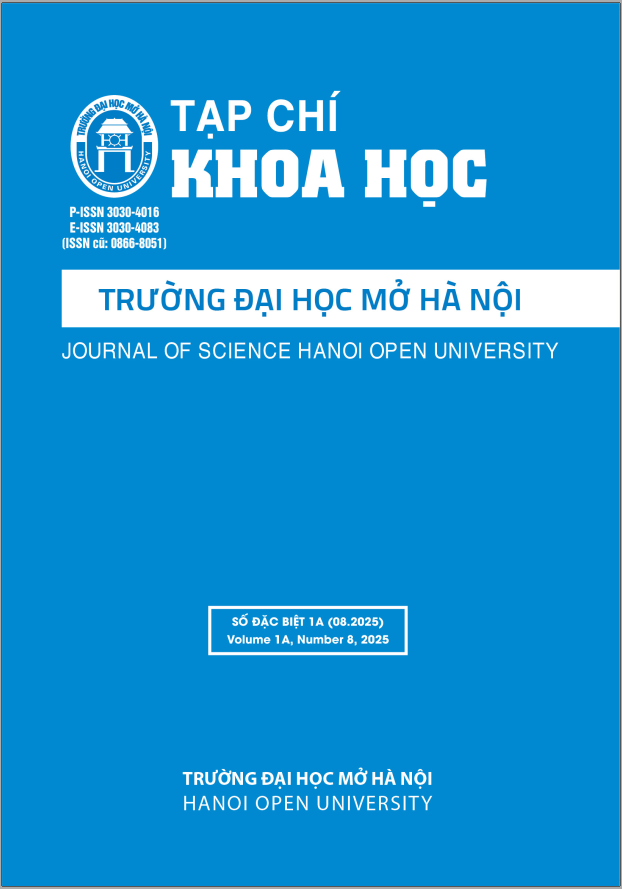MỘT SỐ GIẢI PHÁP NÂNG CAO ĐỘNG LỰC HỌC TIẾNG ANH
DOI:
https://doi.org/10.59266/houjs.2025.638Keywords:
EFL, phương pháp kết hợp, động cơ học EFL của sinh viên IT, khó khăn, ứng xử của giảng viênAbstract
Dựa vào nghiên cứu (NC) theo các phương pháp và mô hình khác nhau của Gardner (1985) hay Deci và Ryan (1985), về động cơ học ngôn ngữ mở ra nền tảng cho giảng viên (GV) và sinh viên (SV) về nghiên cứu các chiến lược linh hoạt để dạy và học tiếng Anh như một ngoại ngữ (EFL) đạt hiệu quả cao nhất. Nhà nghiên cứu (NNC) đề xuất đưa ra một số hiểu biết về cách hỗ trợ sinh viên không chuyên ngành tiếng Anh tham gia vào việc học EFL. Để đạt được mục tiêu này, NNC đã sử dụng phương pháp hỗn hợp. 120 sinh viên năm nhất khoa Công nghệ thông tin (IT) tại Trường Đại học Kinh tế- Kỹ thuật Công nghiệp (UNETI) tham gia trả lời bảng câu hỏi. Thông qua phương pháp hỗn hợp, nghiên cứu đã mang lại phát hiện quan trọng. Sinh viên IT học EFL chủ yếu vì mục đích tìm kiếm cơ hội nghề nghiệp và giao tiếp quốc tế. Hai yếu tố có ảnh hưởng lớn nhất giúp sinh viên tăng động lực học EFL là cách ứng xử của giảng viên và sự khuyến khích của họ đối với sinh viên. Nghiên cứu đã chỉ ra những điểm tương đồng và khác biệt trong cách giảng viên áp dụng nhằm tạo động lực học EFL cho sinh viên như một kinh nghiệm và bài học quý giá để áp dụng vào việc dạy EFL.
References
[1]. Harmer, J. (2007). The practice of English Language Teaching (4th.ed.) Pearson Longman.
[2]. Herzberg, F., (1968). The Motivation to Work (2nd ed.). New York, New York: John Wiley & Sons.
[3]. Knowles, M. S., Holton III, E. F., Swanson, R. A. (2011). The adult learner: The Definitive Classic in Adult Education and Human Resource Development. 7th ed. Oxford: Elsevier
[4]. Lai, E.F. (1999). Motivation to learn English in Hong Kong, Language, Culture and Curriculum, 12, 280- 284.
[5]. Le, X. H, Robert, H., Nguyen, T., &Lilleleht, E. (2005). Vietnamese cultural and religious femininity: Implications for conflict management and synergy. Paper presented at the conference “Unity & Diversity” from 27th 30th January, Seatle.
[6]. Mackey, A., &Gass, S. M. (2005).
Second language research: Methodology and design. New Jersey: Lawrence Erlbaum.
[7]. Morrison, K. R. B. (1993). Planning and Accomplishing School-Centred Evaluation. Dereham, UK: Peter Francis.
[8]. Newby, P. (2010). Research methods for Education. Pearson.
[9]. Nguyen, T. P. L (2008). Factors affecting non- English majors first year students’ motivation in learning reading skills at Hanoi University of Industry. (Unpublished master thesis). Vietnam National University.
[10]. Nguyen, N. G. (2011). Students’ perception on factors affecting English learning motivation of students in strategic mission project at ULIS, VNU. (Unpublished Master dissertation). Vietnam National University.
[11]. Nunan, D. (2001). Second language acquisition. In Carter, R and Nunan, D. (eds) The Cambridge guide to Teaching English to speakers of other language (pp 87-92). Cambrigde university press.
[12]. Patton, M. (1990). Qualitative evaluation and research methods. Newbury Park: Sage Publications.
[13]. Phan H.T.T (2010). Factors affecting the motivation of Vietnamese technical English majors in their English studies (Unpublished Doctor thesis). University of Otago.
[14]. Tran, T. T. T, & Baldauf, R. B. (2007). Demotivation: Understanding resistance to English language learning-The case of Vietnamese students. The Journal of Asia TEFL, 4, 79-105.
[15]. Ton, N. N. H and Pham, H. H. (2010). Vietnamese Teachers’ and Student Perceptions of Global English. Language Education in Asia, 2010, 1(1), 48-61.
[16]. Vygotsky, L.S. (1962). Thought and Language. Cambridge: M.I.T. Press.
[17]. Wilson, N. and Mc Lean, S. (1994). Questionnaire Design: A practical Introduction. Newtown Abbey, Co. Antrim: University of Ulster Press.
